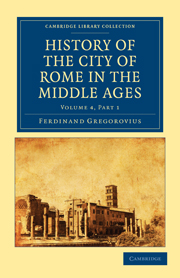CHAPTER VI
Published online by Cambridge University Press: 05 October 2010
Summary
The city of Rome became the theatre of the struggle–prolonged for years – between the two bitter antagonists, the Emperor and the Pope. In this struggle the city herself was almost annihilated, and sank into decay so utter that it constitutes an epoch in her history. This memorable war around Rome was not rendered conspicuous, as earlier wars of the kind had been, by heroic deeds. The means and the forces called into action were insignificant; nevertheless the importance of the struggle, the fate of the besiegers, and the moral greatness of the besieged invest it with an unusual attraction. Henry IV., Gregory VII., Robert Guiscard, the great Countess are the heroes of the tragedy.
The Normans desert Gregory VII
After the summer of 1080 Wibert remained in Ravenna, where he collected troops, while Gregory exerted himself to bring about a crusade against him. The Normans, however, deserted the Pope. Although Guiscard refused to enter into alliance with Henry, he failed to obey the exhortations of the Pope. He was preparing for an expedition against Greece, whither he desired to convey a Byzantine impostor in the guise of the dethroned Michael Ducas. The Pope, forced by necessity, acquiesced in his design, although it deprived him of Norman aid precisely at this juncture.
- Type
- Chapter
- Information
- History of the City of Rome in the Middle Ages , pp. 223 - 260Publisher: Cambridge University PressPrint publication year: 2010First published in: 1896

